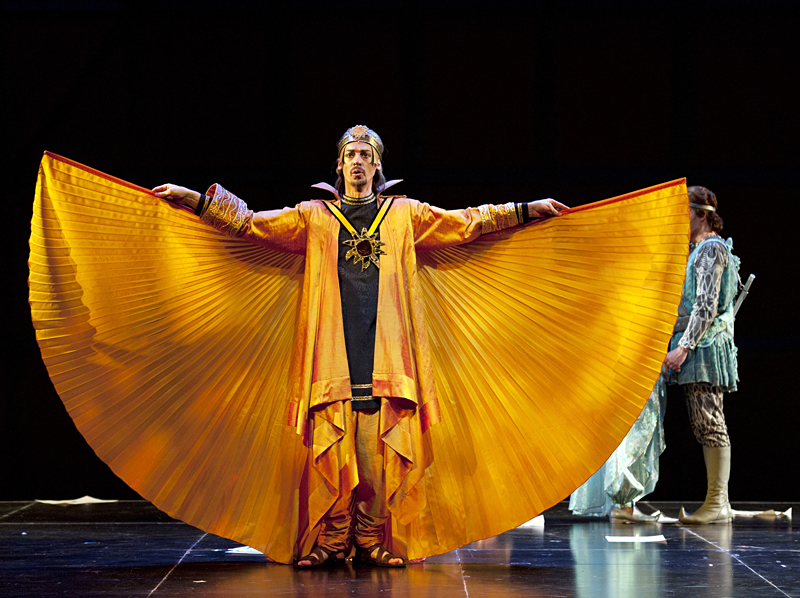Well-sung (generally) though it is, the buzz for Seattle Opera’s presentation of Mozart’s 1791 fairy tale will be about the production—primarily Zandra Rhodes’ extravagant and splashy costumes. The Queen of the Night, for one, gets a diva dress that would make RuPaul palpitate with envy. The set, by Robert Dahlstrom and Robert Schaub, is based inventively on pyramid shapes that include, to beautiful effect, the opening in the stage curtain. The infamous golden arch from 1998’s Tristan und Isolde, which everyone but me hated, seems to be resurrected and redeemed here as a glowing, color-morphing triangle of light forming a proscenium within a proscenium. Under Chris Alexander’s direction, the complicated plot unfurls as neatly and comprehensibly as I’ve ever seen it. (At the core of the story is Prince Tamino’s Masonic-allegorical initiation into some sort of holy brotherhood, requiring the assistance of the title instrument and some two dozen where-the-hell-are-we-now scene changes.)
Most in the large double cast are making their SO debuts, among them two splendid Queens of the Night and two somewhat unsatisfying Sarastros. He’s the high priest who’s her antagonist, who, if he’s not vocally authoritative, is just a stuffed robe spouting Age-of-Enlightenment bromides. Ilya Bannik, in the Saturday cast, has a warm, affable voice I would love to hear singing lieder in someone’s living room, but as a Sarastro in a 2,900-seat hall, he left me unconvinced. Keith Miller’s voice (Sunday) has more carrying power, but is rougher. Both are underpowered at the bottom of their ranges, as if they had tiny internal sound engineers potting them down whenever they dip anywhere below the middle line of the bass clef.
The test for the Queen is her two grand arias. On Saturday, Emily Hindrichs’ opening phrases revealed a rich, bronzed tone that made me wonder how on earth she would manage her upper register, those notorious piping passages where Mozart takes her a full two octaves higher. But she does, triumphantly, singing them not only with clarion tone but, in the Act 2 cry for revenge, “Der Hölle Rache,” suffusing them with all the anger and passion described in the text. Where Hindrichs smoldered throughout, Sunday’s ice queen Mari Moriya, miraculously pure and accurate in these high-flying moments, went into a sort of romantic reverie, chillingly, as if she were falling in twisted love with the very idea of vengeance.







